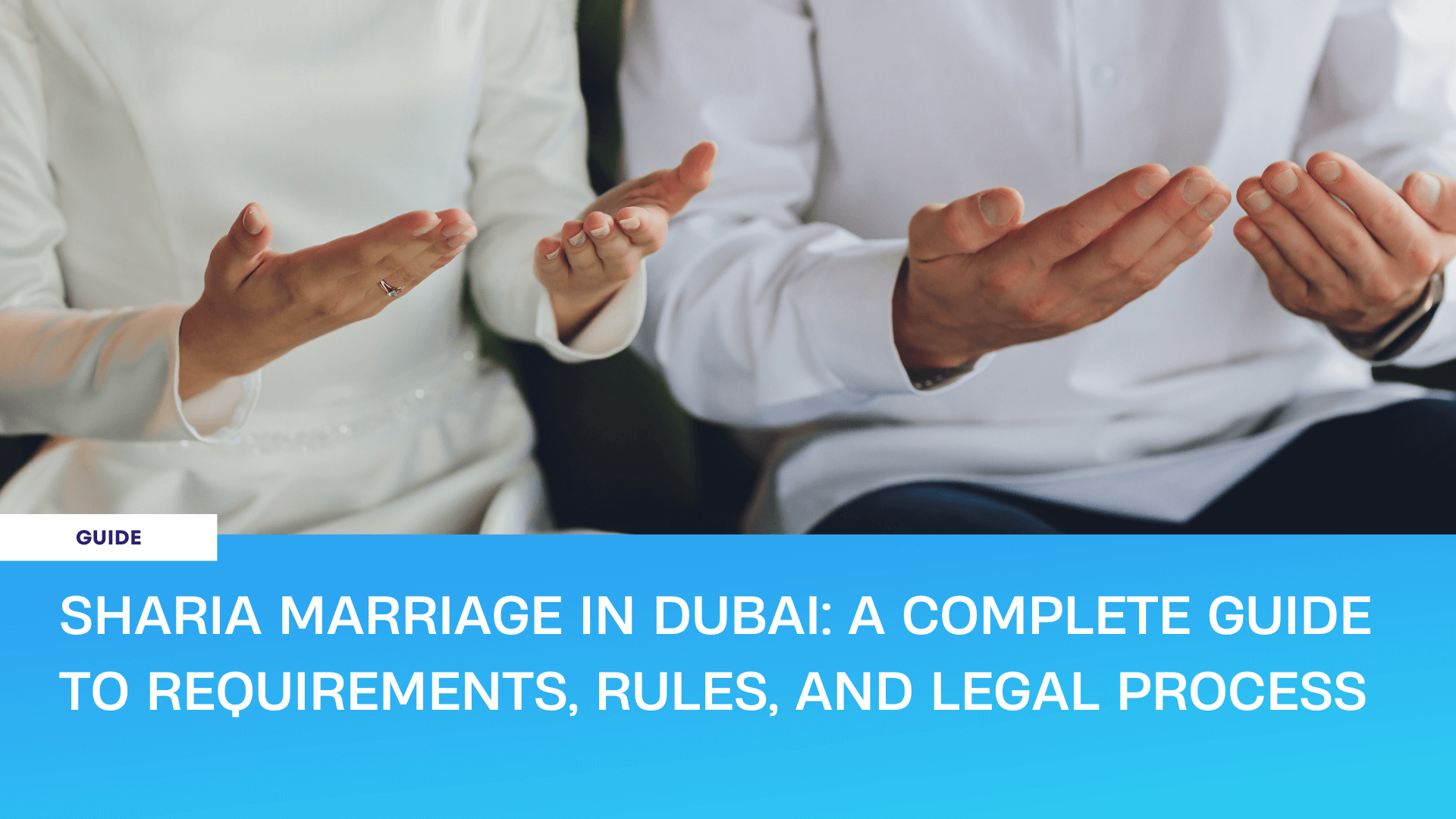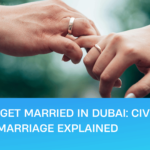Sharia Marriage in Dubai: A Complete Guide to Requirements, Rules, and Legal Process

What is Sharia Marriage? Understanding the Basics
Marriage is a significant milestone, and for Muslim couples in Dubai, a Sharia-compliant marriage ensures that their union aligns with Islamic principles and UAE law. Sharia marriage in Dubai (also known as “Nikāḥ”), is a legal and social contract in Islamic law between a man and a woman. It is based on mutual consent and outlines the rights and responsibilities of both spouses.
In the UAE, Sharia marriage applies in the following cases:
- Both the bride and groom are Muslims.
- The groom is Muslim, and the bride’s religion is from ‘Ahl Al-Kitaab’ (Christian or Jewish faith).
Muslim women cannot marry non-Muslim men unless they convert to Islam and provide proof of conversion. Additionally, UAE law consents to polygamy, allowing a Muslim man to have up to four wives, provided he treats them equally in terms of sustenance and care.
Key Requirements for Sharia Marriage in Dubai
To legally marry under Sharia Law in Dubai, couples must meet these essential requirements:
- Valid Emirates ID for both the bride and groom.
- Valid passport copy for both the bride and groom.
- A premarital screening certificate from an approved UAE health facility.
- Physical presence of both the bride and groom during the ceremony.
- Presence of the bride’s father or guardian (Wali) and two male Muslim witnesses.
- If the bride’s father is deceased or unavailable, the next male guardian relative (e.g. brother, uncle, cousin) must be appointed via a Power of Attorney (POA).
- Divorced or widowed women must provide a Divorce Certificate (if divorced) or a Death Certificate of their late husband (if widowed). If these documents were issued outside the UAE, they must be fully attested and translated into Arabic.
- A No Objection Certificate (NOC) from her embassy or consulate is required if the bride is Muslim but her father is not.
Steps to Register a Sharia-Compliant Marriage in Dubai
Embarking on the journey of marriage in Dubai involves a few key steps to ensure that the union is legally recognized under Sharia Law. Below are the steps:
- Before anything else, the couple must undergo a premarital health screening at an approved UAE health facility. This step is crucial and mandatory, as it ensures both individuals are aware of their medical compatibility and that any infectious and genetic diseases detected are dealt with.
- Once the screening is complete and the medical certificate is obtained, the couple must prepare and submit all other needed documents. This can be submitted through the Dubai Courts Portal or by contacting an accredited marriage officer.
- The couple, along with the bride’s guardian (Wali) and two male Muslim witnesses, must be present at the ceremony, which is conducted by an authorized marriage officiant (Mazoon). The couple has the option to invite the marriage officiant to go to their place to preside over the ceremony at an additional cost.
- Once the marriage has been officiated, the couple will receive a digital copy of their marriage certificate. This document will already serve as their official proof of their union.
Sharia Marriage Rules: Essential Guidelines and What Couples Need to Know
Marriage Contracts and Documentation
- For the marriage to be legally valid anywhere in the UAE, the marriage contract must be registered with the Family Court / Personal Status Court in Dubai.
- At least one party must be a UAE resident or citizen.
- If the bride’s father is deceased, a copy of the Death Certificate must be provided.
- All documents issued outside of the UAE must be fully attested from the UAE Embassy of the issuing country and UAE Ministry of Foreign Affairs, and legally translated in Arabic if it is in a different language.
- Premarital screening must only be conducted in an accredited UAE health facility. For more information, you may visit the EHS website
- Based on the medical screening certificate, the application for marriage may be denied if one of the parties suffers from a:
- genetically inherited blood disease
- transferable disease.
- Legal representatives must provide Power of Attorney (POA), if applicable.
- For UAE Nationals who want to get married, there are special provisions that need to be met. For GCC nationals and citizens of other Islamic countries like citizens of the Kingdom of Saudi Arabia and Bahrain wishing to marry a person of nationality other than theirs, they must obtain the approval of their respective countries.
- A Yemeni, Lebanese or Moroccan woman wishing to marry a man of different nationality must obtain consent from her country. She may contact her Consulate / Embassy regarding this.
Rights and Responsibilities in a Sharia Marriage
- The groom must provide a dowry (Mahr) to the bride, agreed upon before the marriage.
- Under UAE Law, the advance dowry should not exceed AED 20,000 and the deferred dowry should not exceed AED 30,000.
- The husband must provide financial support, including food, housing, medical care, and other necessities.
Sharia Law for Women in Marriage
Key Rights and Protections
In a Sharia-compliant marriage, women are granted significant rights and protections to ensure fairness and security. The marriage contract serves as a safeguard, guaranteeing legal recognition and equality for both spouses. A woman has the fundamental right to consent to marriage, emphasizing that her union must be based on mutual agreement rather than coercion. Additionally, she has the right to retain the ownership of her personal property, maintaining financial independence even after marriage. Husbands are expected to treat their wives with dignity and respect, fostering a relationship built on mutual care and understanding. Beyond the household, women have the right to pursue education and personal development, ensuring that marriage does not hinder their intellectual or professional growth. Financially, a wife is entitled to support from her husband, covering her basic needs such as housing, food, and medical care. These rights collectively highlight the importance of balance and justice within an Islamic marriage, reinforcing the value and protection afforded to women under Sharia law.
How Sharia Marriage is Recognised Internationally
Sharia marriages conducted in Dubai are legally valid within the UAE. However, to be recognized internationally, the marriage certificate must be attested by the UAE Ministry of Foreign Affairs and the relevant embassy/consulate of the destination country.
In the UK and other countries, a marriage performed abroad is generally recognized if it complies with the legal requirements of the country where it was officiated.
FAQs About Sharia Marriage in Dubai
What is the legal age requirement for marriage?
The legal age for marriage is 18 Hijri years. Otherwise, the judge’s approval is necessary if it is less than the legal age. It is also important to note that the age gap between the bride and groom should not be more than twice that of the other. Otherwise, special approval from the court will be required.
Can non-Muslims have a Sharia marriage in Dubai?
If the couples are both non-Muslims, they are not eligible for a Sharia marriage. A Muslim man may marry a Christian or Jewish woman. On the other hand, A Muslim woman cannot marry a non-Muslim man unless he is willing to convert to Islam and provides supporting proof.
Why Choose Dubai for a Sharia-Compliant Marriage?
Dubai offers a well-structured, legally recognized, and efficient process for Muslim couples. The legal framework assures fairness and compliance with Islamic principles. That’s why it is a preferred destination for Muslim couples who want to do Sharia-compliant marriage.
Need help with Sharia marriage in Dubai? Reach out to our marriage experts at POA.ae. Our team makes sure that you get a smooth, hassle-free, and legally compliant marriage registration.
Contact:
📧 jessa@poa.ae | 📞 056 418 1931
Disclaimer: The content on this page is for general information purposes only and does not constitute as legal advice nor should it be used as a basis for any specific action or decision. Nothing on this page is to be considered as creating a lawyer-client relationship or as rendering of legal advice or legal services for any specific matter. Users of this website are advised to seek specific legal advice from their lawyer or a legal counsel regarding any specific legal issues.





